Charles E W Bean, Diaries, AWM38 3DRL 606/116/1 - June - September 1918 - Part 13
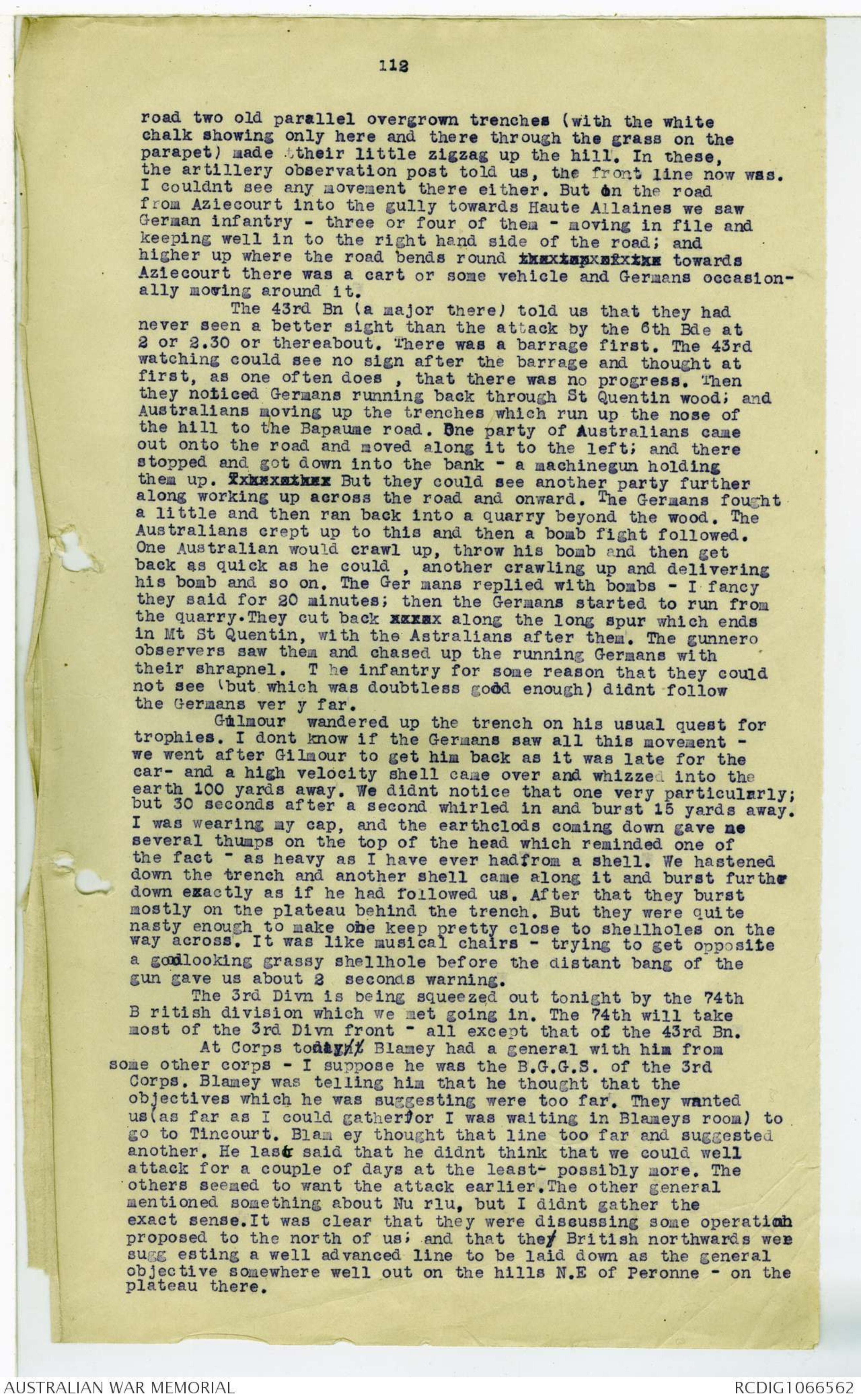
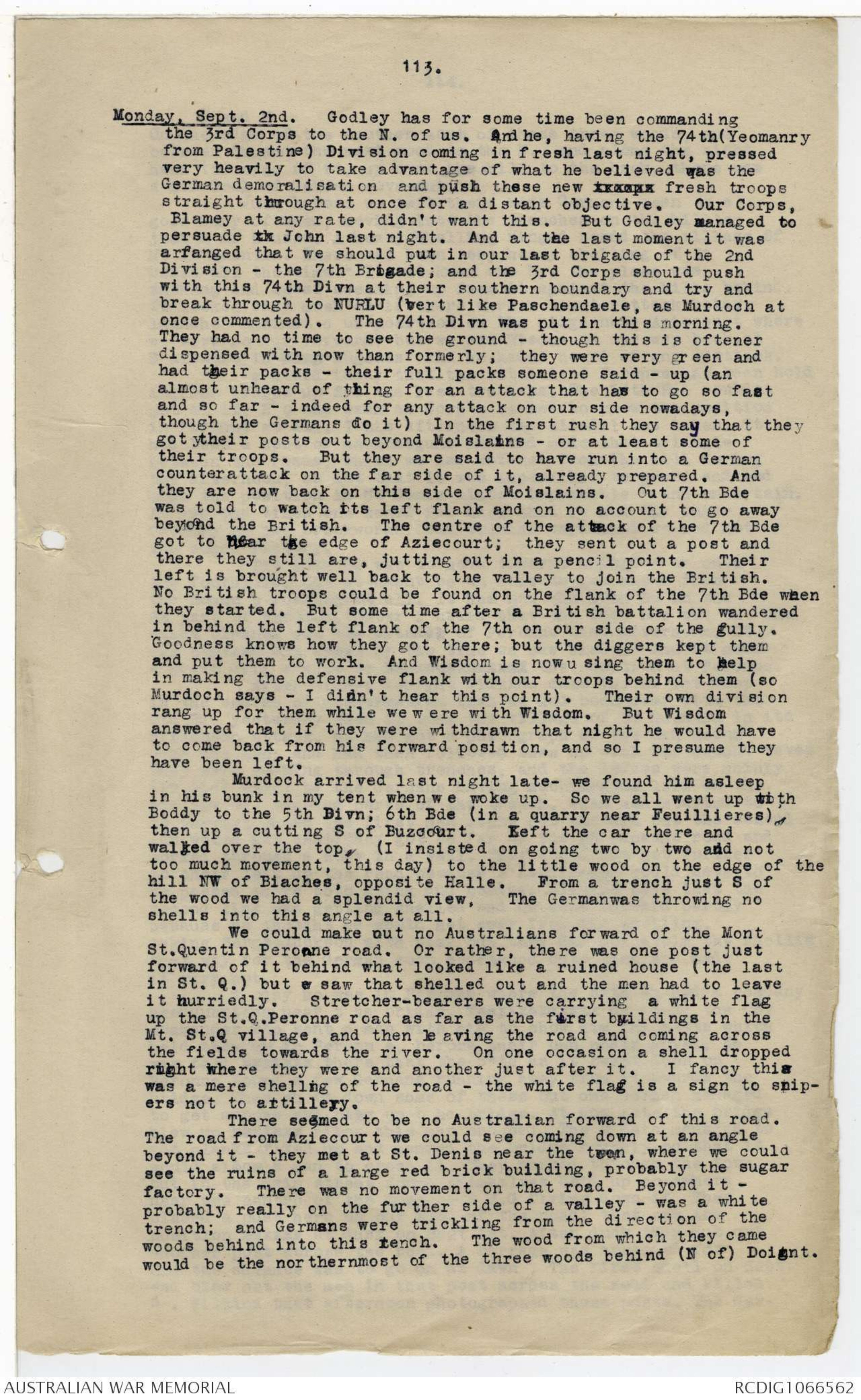
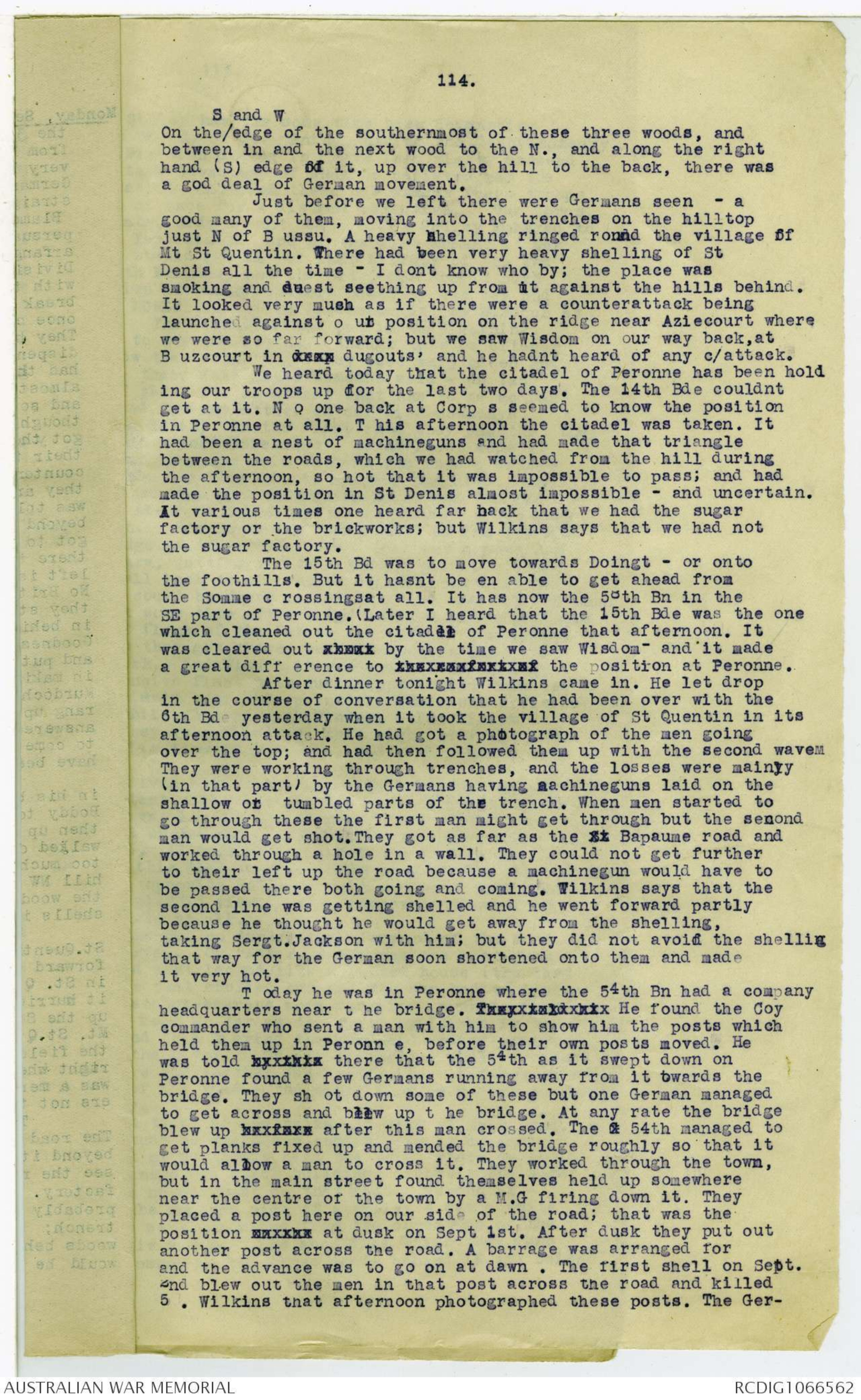
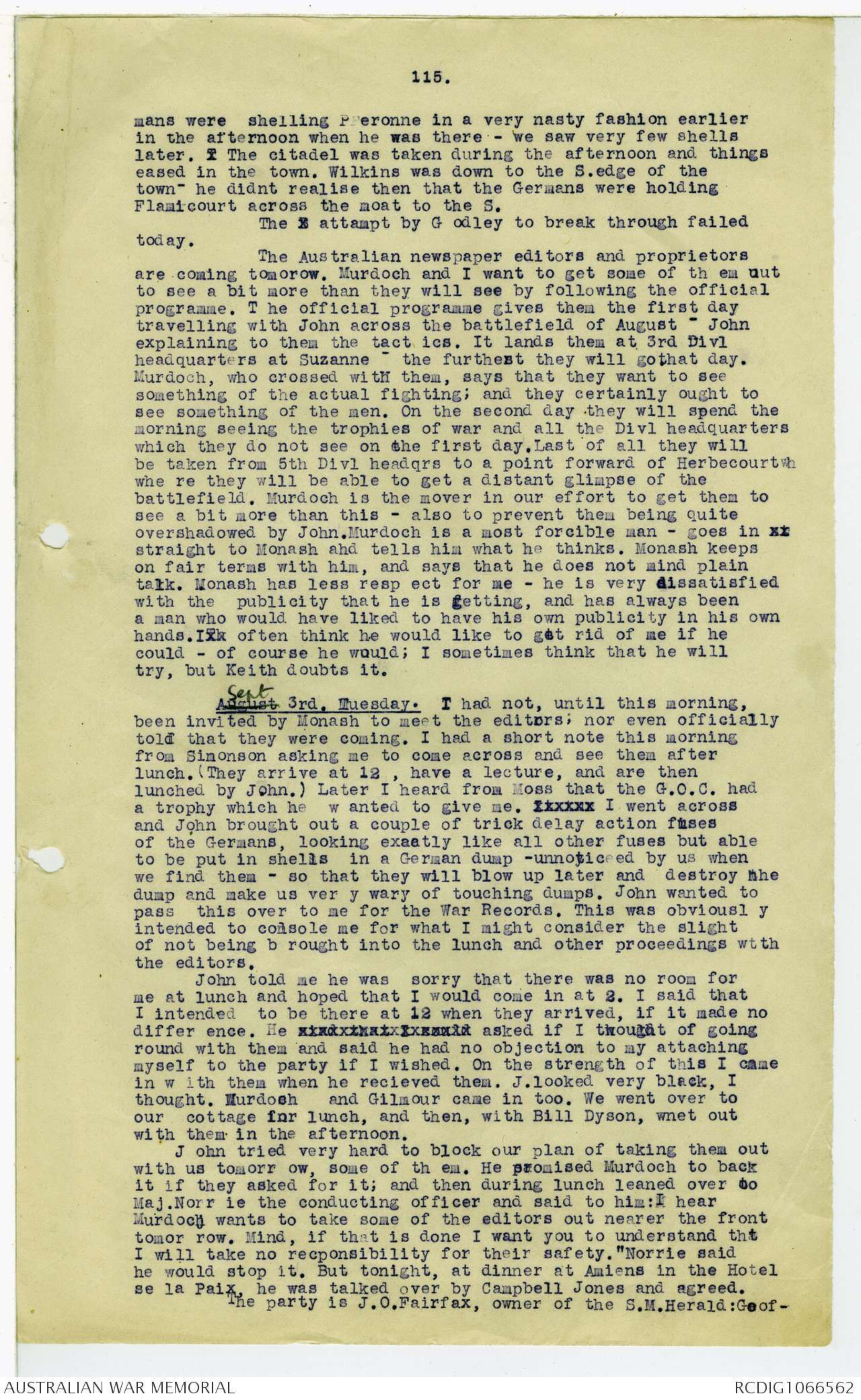
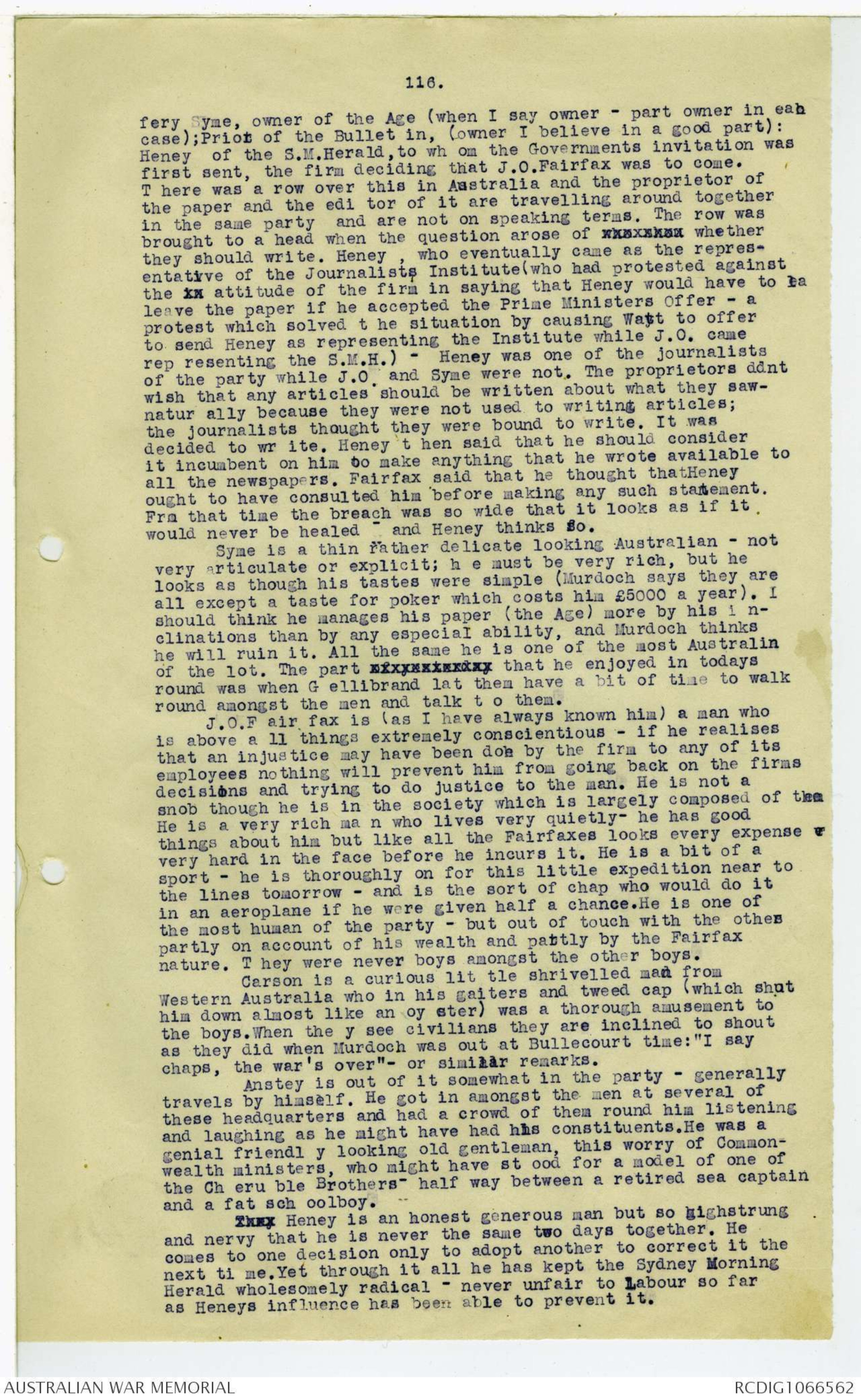
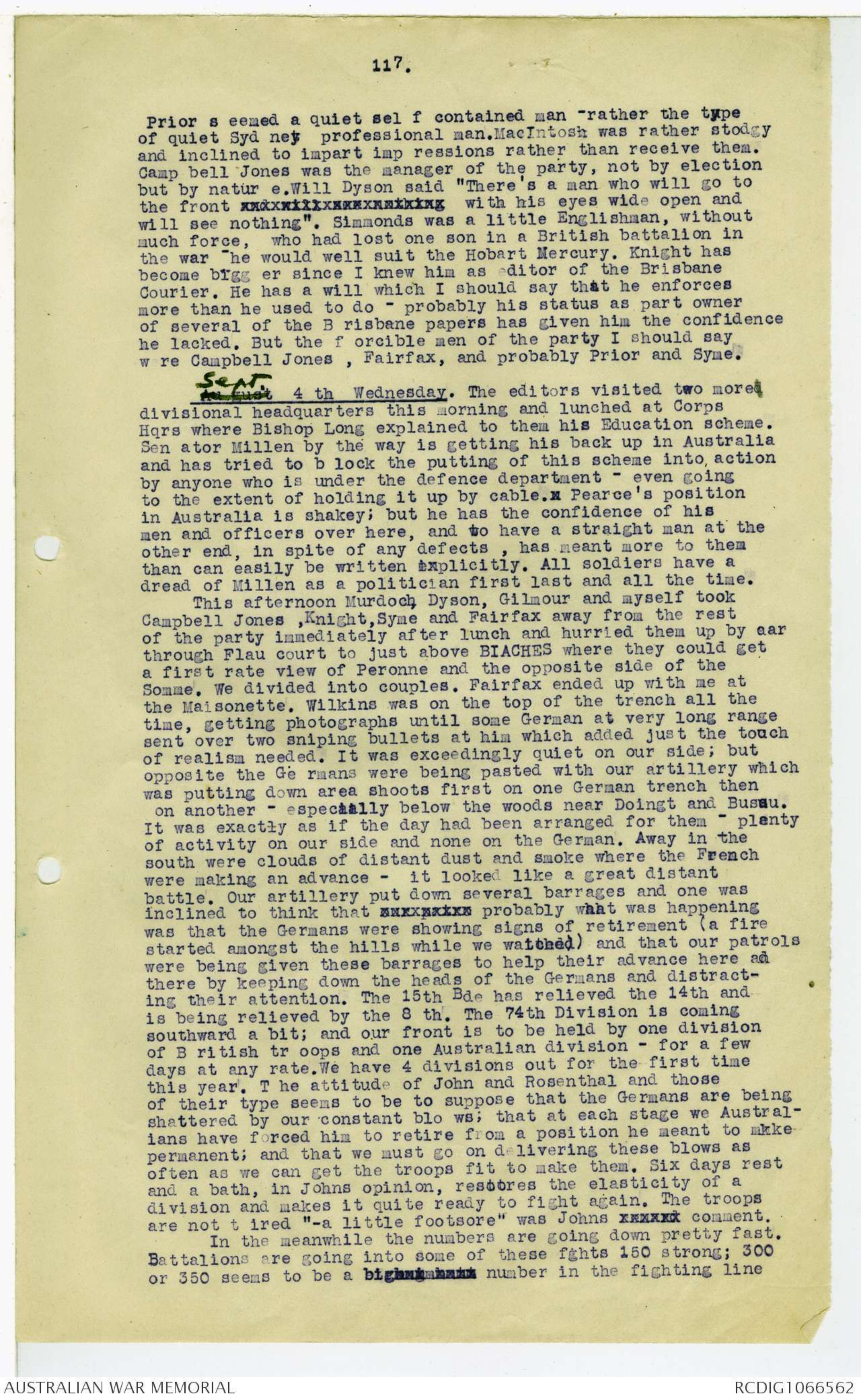
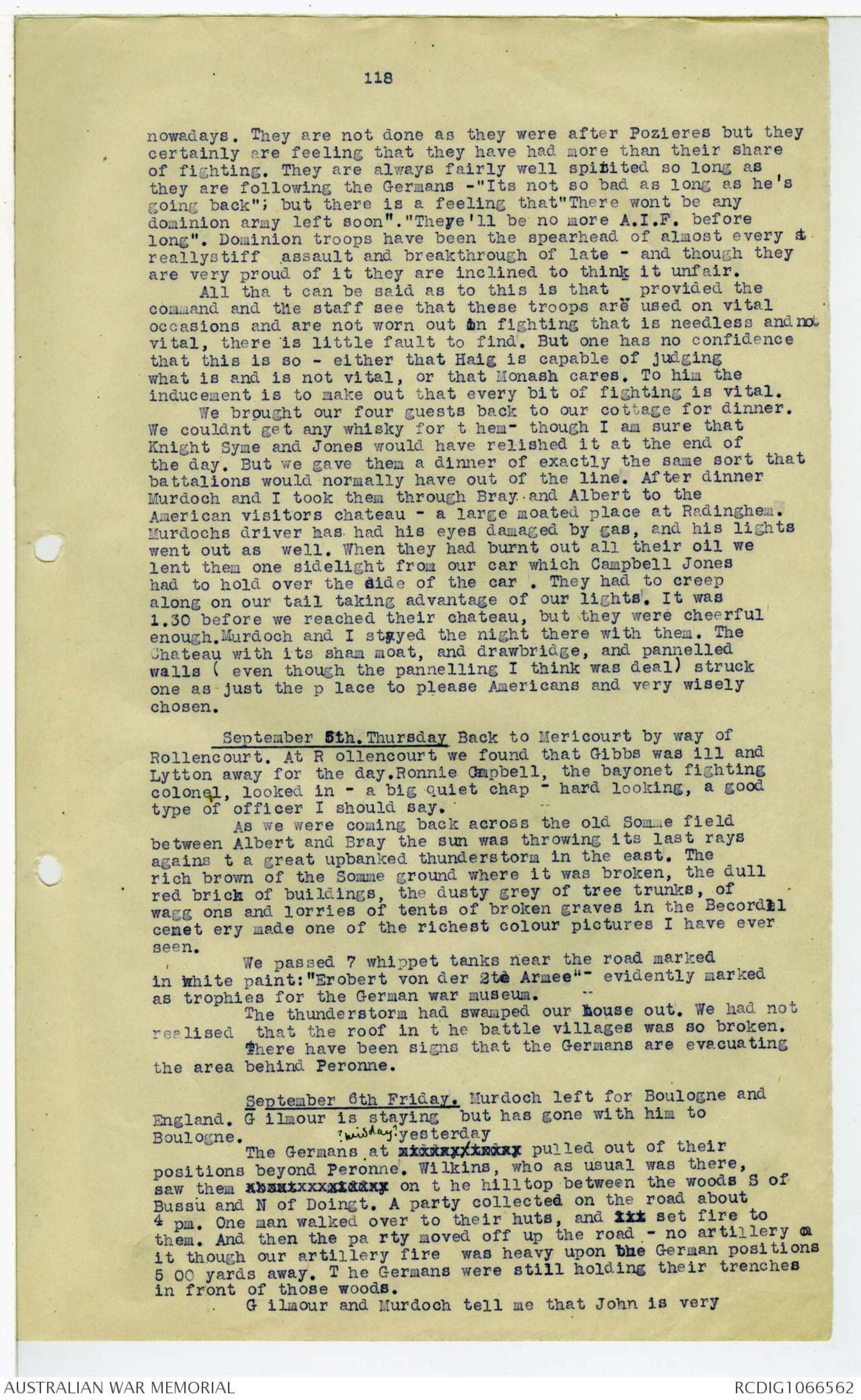
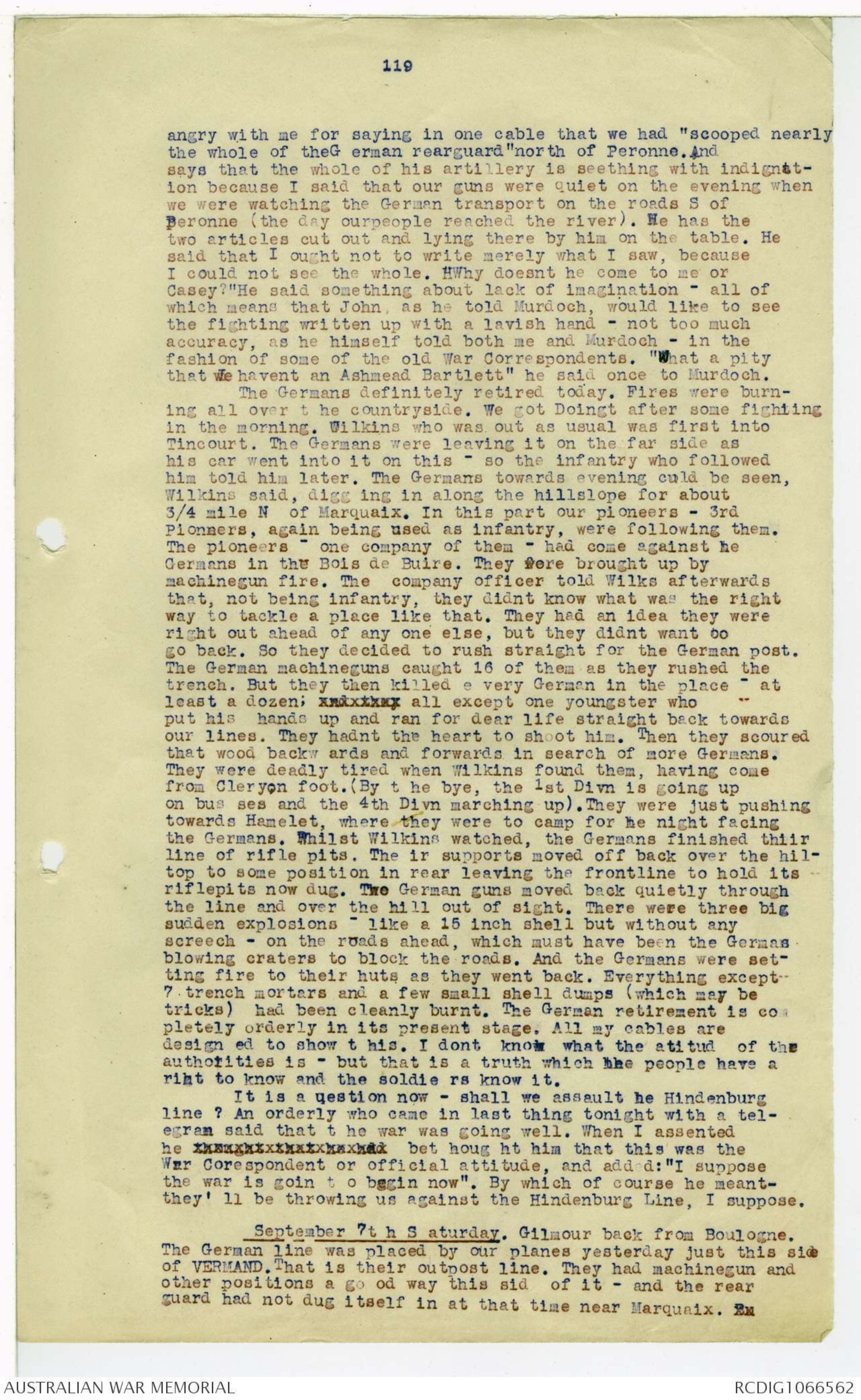
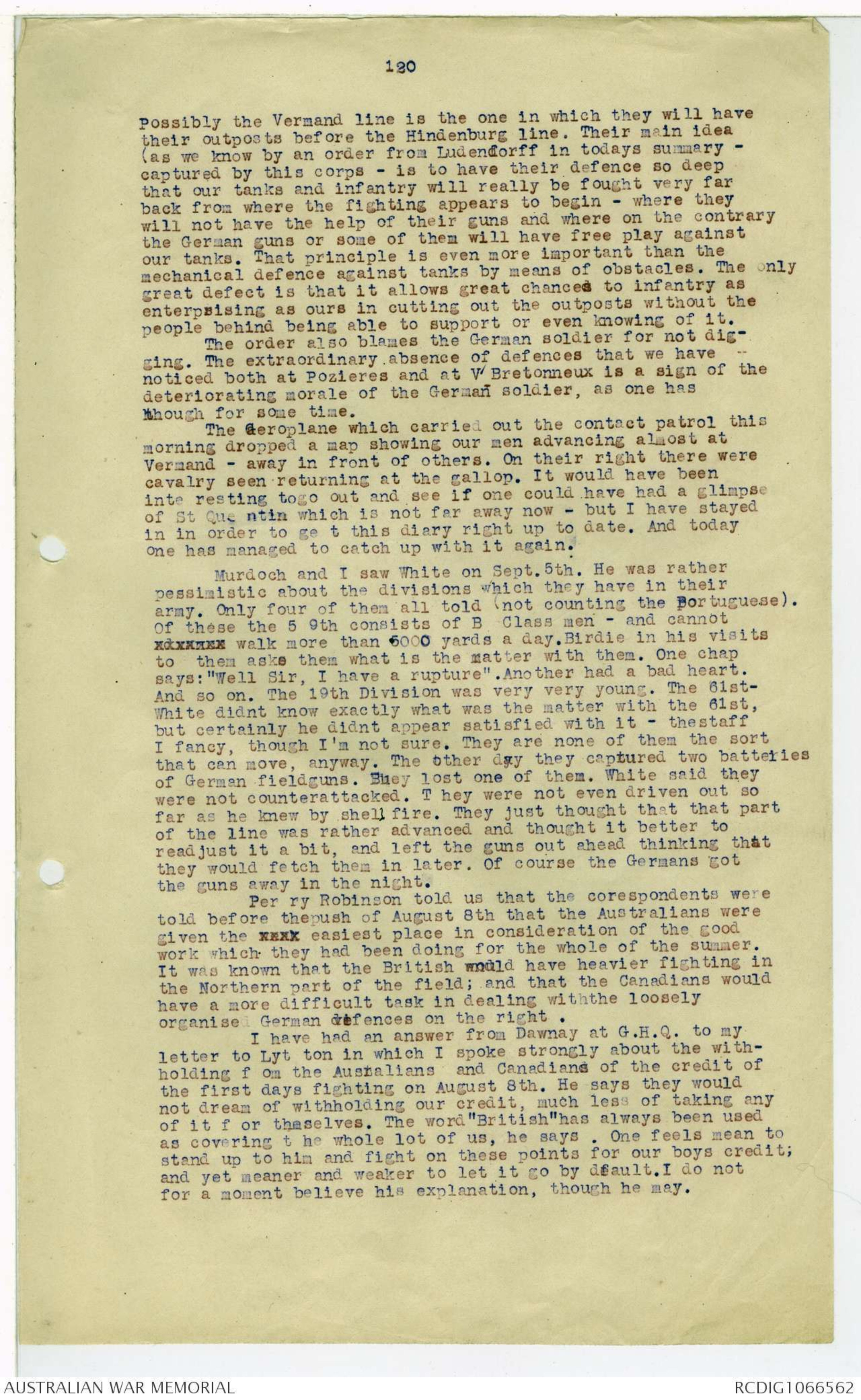
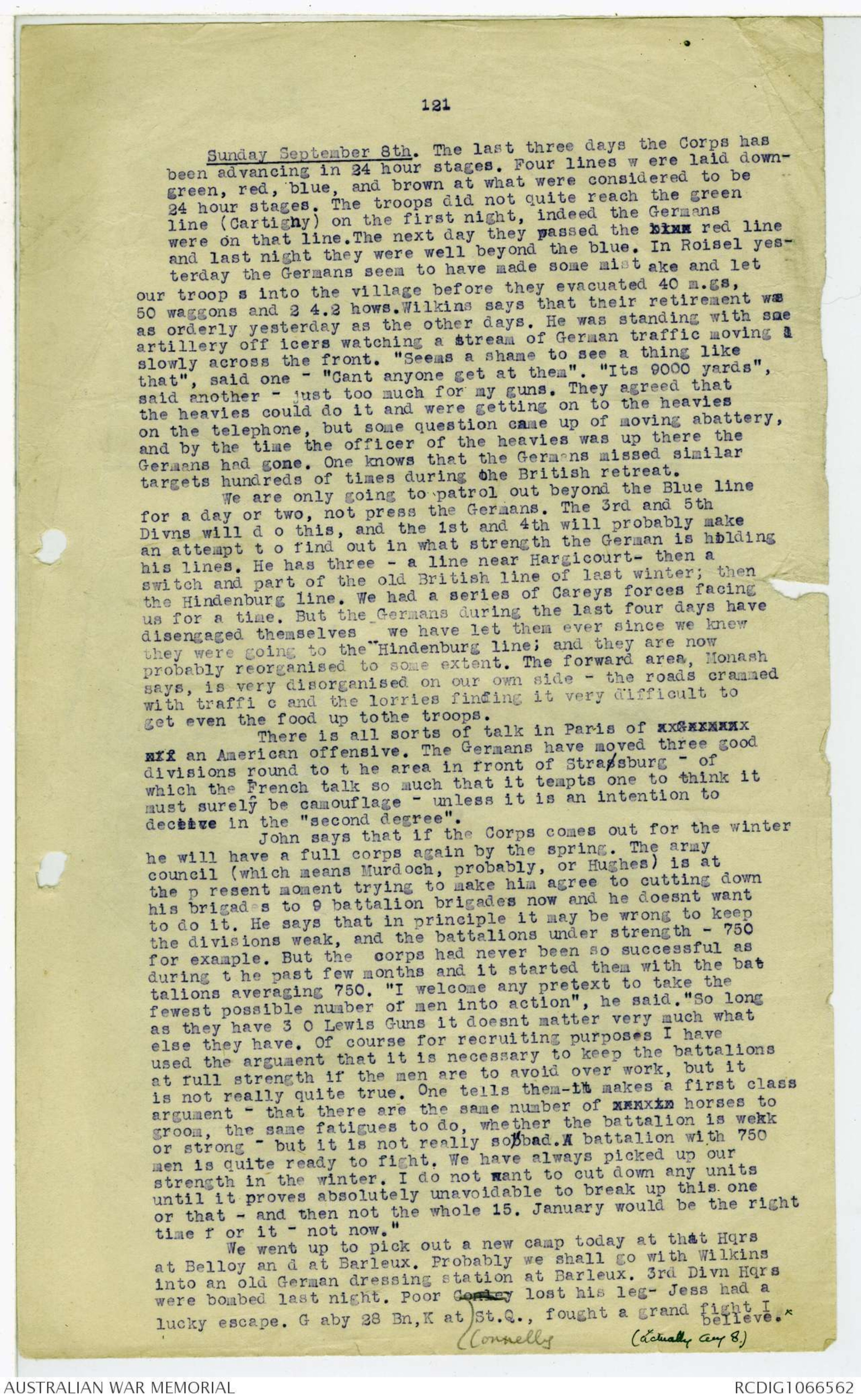
112
road two old parallel overgrown trenches (with the white
chalk showing only here and there through the grass on the
parapet) made their little zigzag up the hill. In these,
the artillery observation post told us, the front line now was.
I couldnt see any movement there either. But on the road
from Aziecourt into the gully towards Haute Allaines we saw
German infantry - three or four of them - moving in file and
keeping well in to the right hand side of the road; and
higher up where the road bends round thetopofthe towards
Aziecourt there was a cart or some vehicle and Germans occasionally
moving around it.
The 43rd Bn (a major there) told us that they had
never seen a better sight than the attack by the 6th Bde at
2 or 2.30 or thereabout. There was a barrage first. The 43rd
watching could see no sign after the barrage and thought at
first, as one often does, that there was no progress. Then
they noticed Germans running back through St Quentin wood; and
Australians moving up the trenches which run up the nose of
the hill to the Bapaume road. One party of Australians came
out onto the road and moved along it to the left; and there
stopped and got down into the bank - a machinegun holding
them up. Txxxxxxxxx But they could see another party further
along working up across the road and onward. The Germans fought
a little and then ran back into a quarry beyond the wood. The
Australians crept up to this and then a bomb fight followed.
One Australian would crawl up, throw his bomb and then get
back as quick as he could, another crawling up and delivering
his bomb and so on. The Germans replied with bombs - I fancy
they said for 20 minutes; then the Germans started to run from
the quarry. They cut back xxxxx along the long spur which ends
in Mt St Quentin, with the Astralians after them. The gunnero
observers saw them and chased up the running Germans with
their shrapnel. The infantry for some reason that they could
not see (but which was doubtless good enough) didnt follow
the Germans very far.
Gilmour wandered up the trench on his usual quest for
trophies. I dont know if the Germans saw all this movement -
we went after Gilmour to get him back as it was late for the
car - and a high velocity shell came over and whizzed into the
earth 100 yards away. We didnt notice that one very particularly;
but 30 seconds after a second whirled in and burst 15 yards away.
I was wearing my cap, and the earthclods coming down gave ne
several thumps on the top of the head which reminded one of
the fact - as heavy as I have ever hadfrom a shell. We hastened
down the trench and another shell came along it and burst furthe
down exactly as if he had followed us. After that they burst
mostly on the plateau behind the trench. But they were quite
nasty enough to make one keep pretty close to shellholes on the
way across. It was like musical chairs - trying to get opposite
a goodlooking grassy shellhole before the distant bang of the
gun gave us about 2 seconds warning.
The 3rd Divn is being squeezed out tonight by the 74th
British division which we met going in. The 74th will take
most of the 3rd Divn front - all except that of the 43rd Bn.
At Corps todaynt Blamey had a general with him from
some other corps - I suppose he was the B.G.G.S. of the 3rd
Corps. Blamey was telling him that he thought that the
objectives which he was suggesting were too far. They wanted
us (as far as I could gather for I was waiting in Blameys room) to
go to Tincourt. Blamey thought that line too far and suggested
another. He last said that he didnt think that we could well
attack for a couple of days at the least- possibly more. The
others seemed to want the attack earlier. The other general
mentioned something about Nurlu, but I didnt gather the
exact sense. It was clear that they were discussing some operation
proposed to the north of us; and that they British northwards were
suggesting a well advanced line to be laid down as the general
objective somewhere well out on the hills N.E. of Peronne - on the
plateau there.
113.
Monday, Sept. 2nd. Godley has for some time been commanding
the 3rd Corps to the N. of us. And he, having the 74th (Yeomanry
from Palestine) Division coming in fresh last night, pressed
very heavily to take advantage of what he believed was the
German demoralisation and push these new xxxxxx fresh troops
straight through at once for a distant objective. Our Corps,
Blamey at any rate, didn't want this. But Godley managed to
persuade th John last night. And at the last moment it was
arranged that we should put in our last brigade of the 2nd
Division - the 7th Brigade; and the 3rd Corps should push
with this 74th Divn at their southern boundary and try and
break through to NURLU (vert like Paschendaele, as Murdoch at
once commented). The 74th Divn was put in this morning.
They had no time to see the ground - though this is oftener
dispensed with now than formerly; they were very green and
had their packs - their full packs someone said - up (an
almost unheard of thing for an attack that has to go so fast
and so far - indeed for any attack on our side nowadays,
though the Germans do it) In the first rush they say that they
got ytheir posts out beyond Moislains - or at least some of
their troops. But they are said to have run into a German
counterattack on the far side of it, already prepared. And
they are now back on this side of Moislains. Out 7th Bde
was told to watch its left flank and on no account to go away
beyond the British. The centre of the attack of the 7th Bde
got to near the edge of Aziecourt; they sent out a post and
there they still are, jutting out in a pencil point. Their
left is brought well back to the valley to join the British.
No British troops could be found on the flank of the 7th Bde when
they started. But some time after a British battalion wandered
in behind the left flank of the 7th on our side of the gully.
Goodness knows how they got there; but the diggers kept them
and put them to work. And Wisdom is now using them to help
in making the defensive flank with our troops behind them (so
Murdoch says - I didn't hear this point). Their own division
rang up for them while we were with Wisdom. But Wisdom
answered that if they were withdrawn that night he would have
to come back from his forward position, and so I presume they
have been left.
Murdock arrived last night late- we found him asleep
in his bunk in my tent when we woke up. So we all went up with
Boddy to the 5th Divn; 6th Bde (in a quarry near Feuillieres),
then up a cutting S of Buzcourt. Left the car there and
walked over the top. (I insisted on going two by two and not
too much movement, this day) to the little wood on the edge of the
hill NW of Biaches, opposite Halle. From a trench just S of
the wood we had a splendid view. The Germanwas throwing no
shells into this angle at all.
We could make out no Australians forward of the Mont
St.Quentin Peronne road. Or rather, there was one post just
forward of it behind what looked like a ruined house (the last
in St. Q.) but w saw that shelled out and the men had to leave
it hurriedly. Stretcher-bearers were carrying a white flag
up the St.Q.Peronne road as far as the first buildings in the
Mt. St.Q. village, and then leaving the road and coming across
the fields towards the river. On one occasion a shell dropped
right where they were and another just after it. I fancy this
was a mere shelling of the road - the white flag is a sign to snipers
not to artillery.
There seemed to be no Australian forward of this road.
The road from Aziecourt we could see coming down at an angle
beyond it- they met at St. Denis near the town, where we could
see the ruins of a large red brick building, probably the sugar
factory. There was no movement on that road. Beyond it -
probably really on the further side of a valley - was a white
trench; and Germans were trickling from the direction of the
woods behind into this trench. The wood from which they came
would be the northernmost of the three woods behind (N of) Doignt.
114.
S and W
On the/edge of the southernmost of these three woods, and
between in and the next wood to the N., and along the right
hand (S) edge of it, up over the hill to the back, there was
a god deal of German movement.
Just before we left there were Germans seen - a
good many of them, moving into the trenches on the hilltop
just N of Bussu. A heavy shelling ringed round the village of
Mt St Quentin. There had been very heavy shelling of St
Denis all the time - I don't know who by; the place was
smoking and duest seething up from it against the hills behind.
It looked very much as if there were a counterattack being
launched against our position on the ridge near Aziecourt where
we were so far forward; but we saw Wisdom on our way back, at
Buzcourt in dxxx dugouts' and he hadnt heard of any c/attack.
We heard today that the citadel of Peronne has been holding
our troops up for the last two days. The 14th Bde couldnt
get at it. No one back at Corps seemed to know the position
in Peronne at all. This afternoon the citadel was taken. It
had been a nest of machineguns and had made that triangle
between the roads, which we had watched from the hill during
the afternoon, so hot that it was impossible to pass; and had
made the position in St Denis almost impossible - and uncertain.
At various times one heard far back that we had the sugar
factory or the brickworks; but Wilkins says that we had not
the sugar factory.
The 15th Bd was to move towards Doingt - or onto
the foothills. But it hasnt been able to get ahead from
the Somme crossingsat all. It has now the 58th Bn in the
SE part of Peronne. (Later I heard that the 15th Bde was the one
which cleaned out the citadel of Peronne that afternoon. It
was cleared out xxxxx by the time we saw Wisdom - and it made
a great difference to the xxxxxxxxxx the position at Peronne.
After dinner tonight Wilkins came in. He let drop
in the course of conversation that he had been over with the
6th Bde yesterday when it took the village of St Quentin in its
afternoon attack. He had got a photograph of the men going
over the top; and had then followed them up with the second waveM
They were working through trenches, and the losses were mainly
(in that part) by the Germans having machineguns laid on the
shallow or tumbled parts of the trench. When men started to
go through these the first man might get through but the senond
man would get shot. They got as far as the xx Bapaume road and
worked through a hole in a wall. They could not get further
to their left up the road because a machinegun would have to
be passed there both going and coming. Wilkins says that the
second line was getting shelled and he went forward partly
because he thought he would get away from the shelling,
taking Sergt.Jackson with him; but they did not avoid the shellig
that way for the German soon shortened onto them and made
it very hot.
Today he was in Peronne where the 54th Bn had a company
headquarters near the bridge. They xxxxxxxx He found the Coy
commander who sent a man with him to show him the posts which
held them up in Peronne, before their own posts moved. He
was told by this there that the 54th as it swept down on
Peronne found a few Germans running away from it towards the
bridge. They shot down some of these but one German managed
to get across and blew up t he bridge. At any rate the bridge
blew up in fact after this man crossed. The x 54th managed to
get planks fixed up and mended the bridge roughly so that it
would allow a man to cross it. They worked through the town,
but in the main street found themselves held up somewhere
near the centre of the town by a M.G firing down it. They
placed a post here on our side of the road; that was the
position xxxxxx at dusk on Sept 1st. After dusk they put out
another post across the road. A barrage was arranged for
and the advance was to go on at dawn. The first shell on Sept.
2nd blew out the men in that post across the road and killed
5 . Wilkins that afternoon photographed these posts. The Germans
115.
were shelling Peronne in a very nasty fashion earlier
in the afternoon when he was there - we saw very few shells
later. T The citadel was taken during the afternoon and things
eased in the town. Wilkins was down to the S.edge of the
town - he didnt realise then that the Germans were holding
Flamicourt across the moat to the S.
The X attempt by Godley to break through failed
today.
The Australian newspaper editors and proprietors
are coming tomorow. Murdoch and I want to get some of them out
to see a bit more than they will see by following the official
programme. The official programme gives them the first day
travelling with John across the battlefield of August - John
explaining to them the tactics. It lands them at 3rd Divl
headquarters at Suzanne - the furthest they will gothat day.
Murdoch, who crossed with them, says that they want to see
something of the actual fighting; and they certainly ought to
see something of the men. On the second day they will spend the
morning seeing the trophies of war and all the Divl headquarters
which they do not see on the first day. Last of all they will
be taken from 5th Divl headqrs to a point forward of Herbecourtwh
where they will be able to get a distant glimpse of the
battlefield. Murdoch is the mover in our effort to get them to
see a bit more than this - also to prevent them being quite
overshadowed by John.Murdoch is a most forcible man- goes in xx
straight to Monash and tells him what he thinks. Monash keeps
on fair terms with him, and says that he does not mind plain
talk. Monash has less respect for me - he is very dissatisified
with the publicity that he is getting, and has always been
a man who would have like to have his own publicity in his own
hands. Ixx often think he would like to get rid of me if he
could - of course he would; I sometimes think that he will
try, but Keith doubts it.
August Sept 3rd, Tuesday. I had not, until this morning,
been invited by Monash to meet the editors; nor even officially
told that they were coming. I had a short note this morning
from Sinonson asking me to come across and see them after
lunch. (They arrive at 12, have a lecture, and are then
lunched by John.) Later I heard from Moss that the G.O.C. had
a trophy which he wanted to give me. xxxxxx I went across
and John brought out a couple of trick delay action fuses
of the Germans , looking exactly like all other fuses but able
to be put in shells in a German dump -unnoticed by us when
we find them - so that they will blow up later and destroy the
dump and make us very wary of touching dumps. John wanted to
pass this over to me for the War Records. This was obviously
intended to console me for what I might consider the slight
of not being brought into the lunch and other proceedings with
the editors.
John told me he was sorry that there was no room for
me at lunch and hoped that I would come in at 2. I said that
I intended to be there at 12 when they arrived, if it made no
difference. He said that xxxxxxxx asked if I thought of going
round with them and said he had no objection to my attaching
myself to the party if I wished. On the strength of this I came
in with them when he recieved them. J. looked very black, I
thought. Murdoch and Gilmour came in too. We went over to
our cottage for lunch, and then, with Bill Dyson, went out
with them in the afternoon.
John tried very hard to block our plan of taking them out
with us tomorrow, some of them. He promised Murdoch to back
it if they asked for it; and then during lunch leaned over to
Maj. Norrie the conducting officer and said to him: I hear
Murdoch wants to take some of editors out nearer the front
tomorrow. Mind, if that is done I want you to understand tht
I will take no recponsibility for their safety. "Norrie said
he would stop it. But tonight, at dinner at Amiens in the Hotel
se la Paix, he was talked over by Campbell Jones and agreed.
The party is J.O.Fairfax, owner of the S.M.Herald: Geoffery
116.
Syme, owner of the Age (when I say owner - part owner in eah
case); Prior of the Bullet in, (owner I believe in good part):
Heney of the S.M.Herald, to whom the Governments invitation was
first sent, the firm deciding that J.O.Fairfax was to come.
There was a row over this in Australia and the proprietor of
the paper and the editor of it are travelling around together
in the same party and are not on speaking terms. The row was
brought to a head when the question arose of xxxxxxxx whether
they should write. Heney , who eventually came as the representative
of the Journalists Institute (who had protested against
the xx attitude of the firm in saying that Heney would have to lea
leave the paper if he accepted the Prime Ministers Offer - a
protest which solved the situation by causing Watt to offer
to send Heney as representing the Institute while J.O. came
rep resenting the S.M.H.) - Heney was one of the journalists
of the party while J.O. and Syme were not. The proprietors ddnt
wish that any articles should be written about what they saw-
naturally because they were not used to writing articles;
the journalists thought they were bound to write. It was
decided to write. Heney then said that he should consider
it incumbent on him to make anything that he wrote available to
all the newspapers. Fairfax said that he though thatHeney
ought to have consulted him before making any such statement.
From that time the breach was so wide that it looks as if it
would never be healed - and Heney thinks so.
Syme is a thin rather delicate looking Australian - not
very articulate or explicit; he must be very rich, but he
looks as though his tastes were simple (Murdoch says they are
all except a taste for poker which costs him £5000 a year). I
should think he manages his paper (the Age) more by his
inclinations than by an especial ability, and Murdoch thinks
he will ruin it. All the same he is one of the most Australin
of the lot. The part xxxxxxxxxxx that he enjoyed in todays
round was when Gellibrand lat them have a bit of time to walk
round amongst the men and talk t o them.
J.O.Fairfax is (as I have always known him) a man who
is above all things extremely conscientious - if he realises
that an injustice may have been don by the firm to any of its
employees nothing will prevent him from going back on the firms
decisions and trying to do justice to the man. He is not a
snob though he is in the society which is largely composed of thm
He is a very rich man who lives very quietly - he has good
things about him but like all the Fairfaxes looks every expense v
very hard in the face before he incurs it. He is a bit of a
sport - he is thoroughly on for this little expedition near to
the lines tomorrow - and is the sort of chap who would do it
in an aeroplane if he were given half a chance.He is one of
the most human of the party - but out of touch with the others
partly on account of his wealth and partly by the Fairfax
nature. They were never boys amongst the other boys.
Carson is a curious little shrivelled man from
Western Australia who in his gaiters and tweed cap (which shut
him down almost like an oyster) was a thorough amusement to
the boys. When they see civilians they are inclined to shout
as they did when Murdoch was out at Bullecourt time: "I say
chaps, the war's over" - or similar remarks.
Anstey is out of it somewhat in the party - generally
travels by himself. He got in amongst the men at several of
these headquarters and had a crowd of them round him listening
and laughing as he might have had his constituents. He was a
genial friendl y looking old gentleman, this worry of Commonwealth
ministers, who might have stood for a model of one of
the Cheruble Brothers - half way between a retired sea captain
and a fat schoolboy.
They Heney is an honest generous man but so highstrung
and nervy that he is never the same two days together. He
comes to one decision only to adopt another to correct it the
next time. Yet through it all he has kept the Sydney Morning
Herald wholesomely radical - never unfair to Labour so far
as Heneys influence has been able to prevent it.
117.
Prior seemed a quiet self contained man - rather the type
of quiet Sydney professional man.MacIntosh was rather stodgy
and inclined to impart impressions rather than receive them.
Campbell Jones was the manager of the party, not by election
but by nature. Will Dyson said "There's a man who will go to
the front and will xxxxxxxxking with his eyes wide open and
will see nothing". Simmonds was a little Englishman, without
much force, who had lost one son in a British battalion in
the war - he would well suit the Hobart Mercury. Knight has
become bigger since I knew him as editor of the Brisbane
Courier. He has a will which I should say that he enforces
more than he used to do - probably his status as part owner
of several of the Brisbane papers has given him the confidence
he lacked. But the forcible men of the party I should say
w re Campbell Jones , Fairfax, and probably Prior and Syme.
August Sept. 4 th Wednesday. The editors visited two mores
divisional headquarters this morning and lunched at Corps
Hqrs where Bishop Long explained to them his Education scheme.
Senator Millen by the way is getting his back up in Australia
and has tried to block the putting of this scheme into action
by anyone who is under the defence department - even going
to the extent of holding it up by cable. x Pearce's position
in Australia is shakey; but he has the confidence of his
men and officers over here, and to have a straight man at the
other end, in spite of any defects, has meant more to them
than can easily be written explicitly. All soldiers have a
dread of Millen as a politician first last and all the time.
This afternoon Murdoch, Dyson, Gilmour and myself took
Campbell Jones ,Knight, Syme and Fairfax away from the rest
of the party immediately after lunch and hurried them up by car
through Flaucourt to just above BIACHES where they could get
a first rate view of Peronne and the opposite side of the
Somme. We divided into couples. Fairfax ended up with me at
the Maisonette. Wilkins was on the top of the trench all the
time, getting photographs until some German at very long range
sent over two sniping bullets at him which added just the touch
of realism needed. It was exceedingly quiet on our side; but
opposite the Germans were being pasted with our artillery which
was putting down area shoots first on one German trench then
on another - especially below the woods near Doingt and Bussu.
It was exactly as if the day had been arranged for them - plenty
of activity on our side and none on the German. Away in the
south were clouds of distant dust and smoke where the French
were making an advance - it looked like a great distant
battle. Our artillery put down several barrages and one was
inclined to think that xxxxxxxx probably what was happening
was that the Germans were showing signs of retirement (a fire
started amongst the hills while we watched) and that our patrols
were being given these barrages to help their advance here and
there by keeping down the heads of the Germans and distracting
their attention. The 15th Bde has relieved the 14th and
is being relieved by the 8 th. The 74th Division is coming
southward a bit; and our front is to be held by one division
of British troops and one Australian division - for a few
days at any rate. We have 4 divisions out for the first time
this year. The attitude of John and Rosenthal and those
of their type seems to be to suppose that the Germans are being
shattered by our constant blows; that at each stage we Australians
have forced him to retire from a position he meant to mkke
permanent; and that we must go on delivering these blows as
often as we can get the troops fit to make them. Six days rest
and a bath, in Johns opinion, restores the elasticity of a
division and makes it quite ready to fight again. The troops
are not tired "-a little footsore" was Johns xxxxx comment.
In the meanwhile the numbers are going down pretty fast.
Battalions are going into some of these fights 150 strong; 300
or 350 seems to be a big xxxxxxxxx number in the fighting line
118
nowadays. They are not done as they were after Pozieres but they
certainly are feeling that they have had more than their share
of fighting. They are always fairly well spirited as long as
they are following the Germans - "Its not so bad as long as he's
going back"; but there is a feeling that "There wont be any
dominion army left soon". "Theye'll be no more A.I.F. before
long". Dominion troops have been the spearhead of almost every &
reallystiff assault and breakthrough of late - and though they
are very proud of it they are inclined to think it unfair.
All that can be said as to this is that _ provided the
command and the staff see that these troops are used on vital
occasions and are not worn out in fighting that is needless and not
vital, there is little fault to find. But one has no confidence
that this is so - either that Haig is a capable of judging
what is and is not vital, or that Monash cares. To him the
inducement is to make out that every bit of fighting is vital.
We brought our four guests back to our cottage for dinner,
We couldn't get any whisky for them - though I am sure that
Knight Syme and Jones would have relished it at the end of
the day. But we gave them a dinner of exactly the same sort that
battalions would normally have out of the line. After dinner
Murdoch and I took them through Bray and Albert to the
American visitors chateau - a large moated place at Radinghem.
Murdochs driver has had his eyes damaged by gas, and his lights
went out as well. When they had burnt out all their oil we
lent them one sidelight from our car which Campbell Jones
had to hold over the side of the car. They had to creep
along on our tail taking advantage of our lights. It was
1.30 before we reached their chateau, but they were cheerful
enough. Murdoch and I stayed the night there with them. The
Chateau with its sham moat, and drawbridge, and pannelled
walls ( even though the pannelling I think was deal) struck
one as just the place to please Americans and very wisely
chosen.
September 5th. Thursday Back to Mericourt by way of
Rollencourt. At Rollencourt we found that Gibbs was ill and
Lytton away for the day.Ronnie Cmpbell, the bayonet fighting
colonel, looked in - a big quiet chap - hard looking, a good
type of officer I should say.
As we were coming back across the old Somme field
between Albert and Bray the sun was throwing its last rays
against a great upbanked thunderstorm in the east. The
rich brown of the Somme ground where it was broken, the dull
red brick of buildings. the dusty grey of tree trunks, of
waggons and lorries of tents of broken graves in the Becordll
cemetery made one of the richest colour pictures I have ever
seen.
We passed 7 whippet tanks near the road marked
in white paint: "Erobert von der 2te Armee"- evidently marked
as trophies for the German war museums.
The thunderstorm had swamped our house out. We had not
realised that the roof in the battle villages was so broken.
There have been signs that the Germans are evacuating
the area behind Peronne.
September 6th Friday. Murdoch left for Boulogne and
England. Gilmour is staying but has gone with him to
Boulogne.
The Germans at ?midday? xxxxxxxxxxxx yesterday pulled out of their
positions beyond Peronne. Wilkins, who as usual was there,
saw them xxxxxxxxxxxxx on the hilltop between the woods S of
Bussu and N of Doingt. A party collected on the road about
4 pm. One man walked over to their huts, and xxx set fire to
them. And then the party moved off up the road - no artillery on
it though our artillery fire was heavy upon the German positions
500 yards away. The Germans were still holding their trenches
in front of those woods.
Gilmour and Murdoch tell me that John is very
119
angry with me for saying in one cable that we had "scooped nearly
the whole of theGerman rearguard"north of Peronne. And
says that the whole of his artillery is seething with indignation
because I said that our guns were quiet on the evening when
we were watching the German transport on the roads S of
Peronne (the day ourpeople reached the river). He has the
two articles cut out and lying there by him on the table. He
said that I ought not to write merely what I saw, because
I could not see the whole. HWhy doesnt he come to me or
Casey?"He said something about lack of imagination - all of
which means that John, as he told Murdoch, would like to see
the fighting written up with a lavish hand - not too much
accuracy, as he himself told both me and Murdoch - in the
fashion of some of the old War Correspondents. "What a pity
that we havent an Ashmead Bartlett" he said once to Murdoch.
The Germans definitely retired today. Fires were burning
all over the countryside. We got Doingt after some fighting
in the morning. Wilkins who was out as usual was first into
Tincourt. The Germans were leaving it on the far side as
his car went into it on this - so the infantry who followed
him told him later. The Germans towards evening could be seen,
Wilkins said, digging in along the hillslope for about
3/4 mile N of Marquaix. In this part our pioneers - 3rd
Pioneers, again being used as infantry, were following them.
The pioneers - one company of them - had come against the
Germans in the Bois de Buire. They were brought up by
machinegun fire. The company officer told Wilks afterwards
that, not being infantry, they didnt know what was the right
way to tackle a place like that. They had an idea they were
right out ahead of any one else, but they didnt want to
go back. So they decided to rush straight for the German post.
The German machineguns caught 16 of them as they rushed the
trench. But they then killed every German in the place - at
least a dozen; xxxxxxxx all except one youngster who --
put his hands up and ran for dear life straight back towards
our lines. They hadnt the heart to shoot him. Then they scoured
that wood backwards and forwards in search of more Germans.
They were deadly tired when Wilkins found them, having come
from Cleryon foot. (By the bye, the 1st Divn is going up
on busses and the 4th Divn marching up). They were just pushing
towards Hamelet, where they were to camp for he night facing
the Germans. Whilst Wilkins watched, the Germans finished thiir
line of rifle pits. Their supports moved off back over the hiltop
to some position in rear leaving the frontline to hold its
riflepits now dug. Two German guns moved back quietly through
the line and over the hill out of sight. There were three big
sudden explosions - like a 15 inch shell but without any
screech - on the roads ahead, which must have been the Germans
blowing craters to block the roads. And the Germans were setting
fire to their huts as they went back. Everything except
7 trench mortars and a few small shell dumps (which may be
tricks) had been cleanly burnt. The German retirement is completely
orderly in its present stage. All my cables are
designed to show this. I dont know what the atitud of the
authorities is - but that is a truth which the people have a
riht to know and the soldiers know it.
It is a question now - shall we assault he Hindenburg
line ? An orderly who came in last thing tonight with a telegram
said that the war was going well. When I assented
he xxxxxxxxxxxxxxxxxxx bethought him that this was the
War Corespondent or official attitude, and added:"I suppose
the war is goin to begin now". By which of course he meant-
they'll be throwing us against the Hindenburg Line, I suppose.
September 7th Saturday. Gilmour back from Boulogne.
The German line was placed by our planes yesterday just this side
of VERMAND. That is their outpost line. They had machinegun and
other positions a good way this sid of it - and the rear
guard had not dug itself in at that time near Marquaix. xx
120
Possibly the Vermand line is the one in which they will have
their outposts before the Hindenburg line. Their main idea
(as we know by an order from Ludendorff in todays summary -
captured by this corps - is to have their defence so deep
that our tanks and infantry will really be fought very far
back from where the fighting appears to begin - where they
will not have the help of their guns and where on the contrary
the German guns or some of them will have free play against
our tanks. That principle is even more important than the
mechanical defence against tanks by means of obstacles. The only
great defect is that it allows great chances to infantry as
enterprising as ours in cutting out the outposts without the
people behind being able to support or even knowing of it.
The order also blames the German soldier for not digging.
The extraordinary absence of defences that we have
noticed both at Pozieres and at V Bretonneux is a sign of the
deteriorating morale of the German soldier, as one has
though for some time.
The aeroplane which carried out the contact patrol this
morning dropped a map showing our men advancing almost at
Vermand - away in front of others. On their right there were
cavalry seen returning at the gallop. It would have been
interesting togo out and see if one could have had a glimpse
of St Quentin which is not far away now - but I have stayed
in in order to get this diary right up to date. And today
one has managed to catch up with it again.
Murdoch and I saw White on Sept. 5th. He was rather
pessimistic about the divisions which they have in their
army. Only four of them all told (not counting the Portuguese).
Of these the 5 9th consists of B Class men - and cannot
xxxxxxx walk more than 6000 yards a day.Birdie in his visits
to them asks them what is the matter with them. One chap
says: "Well Sir, I have a rupture". Another had a bad heart.
And so on. The 19th Division was very very young. The 61st -
White didnt know exactly what was the matter with the 61st,
but certainly he didnt appear satisfied with it - thestaff
I fancy, though I'm not sure. They are none of them the sort
that can move anyway. The other day they captured two batteries
of German fieldguns. They lost one of them. White said they
were not counterattacked. They were not even driven out so
far as he knew by shell fire. They just thought that that part
of the line was rather advanced and thought it better to
readjust it a bit, and left the guns out ahead thinking that
they would fetch them in later. Of course the Germans got
the guns away in the night.
Perry Robinson told us that the correspondents were
told before thepush of August 8th that the Australians were
given the xxxx easiest place in consideration of the good
work which they had been doing for the whole of the summer.
It was known that the British would have heavier fighting in
the Northern part of the field; and that the Canadians would
have a more difficult task in dealing withthe loosely
organised German defences on the right.
I have had an answer from Dawnay at G.H.Q. to my
letter to Lytton in which I spoke strongly about the
withholding fom the Australians and Canadians of the credit of
the first days fighting on August 8th. He says they would
not dream of withholding our credit, much less of taking any
of it for themselves. The word "British" has always been used
as covering the whole lot of us, he says . One feels mean to
stand up to him and fight on these points for our boys credit;
and yet meaner and weaker to let it go by default. I do not
for a moment believe his explanation, though he may.
121
Sunday September 8th. The last three days the Corps has
been advancing in 24 hour stages. Four lines were laid down-
green, red, blue, and brown at what were considered to be
24 hour stages. The troops did not quite reach the green
line (Cartigny) on the first night, indeed the Germans
were on that line. The next day they passed the blue red line
and last night they were well beyond the blue. In Roisel yesterday
the Germans seem to have made some mistake and let
our troops into the village before they evacuated 40 m.gs.,
50 waggons and 2 4.2 hows. Wilkins says that their retirement ws
as orderly yesterday as the other days. He was standing with sme
artillery officers watching a stream of German traffic moving x
slowly across the front. "Seems a shame to see a thing like
that", said one - "Cant anyone get at them". "Its 9000 yards",
said another - just too much for my guns. They agreed that
the heavies could do it and were getting on to the heavies
on the telephone, but some question came up of moving abattery,
and by the time the officer of the heavies was up there the
Germans had gone. One knows that the Germans missed similar
targets hundreds of times during the British retreat.
We are only going to patrol out beyond the Blue line
for a day or two, not press the Germans. The 3rd and 5th
Divns will do this, and the 1st and 4th will probably make
an attempt to find out in what strength the German is holding
his lines. He has three - a line near Hargicourt - then a
switch and part of the old British line of last winter; then
the Hindenburg Line. We had a series of Careys forces facing
us for a time. But the Germans during the last four days have
disengaged themselves - we have let them ever since we knew
they were going to the "Hindenburg line; and they are now
probably reorganised to some extent. The forward area, Monash
says, is very disorganised on our own side - the roads crammed
with traffic and the lorries finding it very difficult to
get even the food up tothe troops.
There is all sorts of talk in Paris of xxxxxxxx
xxx an American offensive. The Germans have moved three good
divisions round to the area in front of Strassburg - of
which the French talk so much that it tempts one to think it
must surely be camouflage - unless it is an intention to
deceive in the "second degree".
John says that if the Corps comes out for the winter
he will have a full corps again by the spring. The army
council (which means Murdoch, probably, or Hughes) is at
the present moment trying to make him agree to cutting down
his brigades to 9 battalion brigades now and he doesnt want
to do it. He says that in principle it may be wrong to keep
the divisions weak, and the battalions under strength - 750
for example. But the corps had never been so successful as
during the past few months and it started them with the battalions
averaging 750. "I welcome any pretext to take the
fewest possible number of men into action", he said. "So long
as they have 30 Lewis Guns it doesn't matter very much what
else they have. Of course for recruiting purposes I have
used the argument that it is necessary to keep the battalions
at full strength if the men are to avoid over work, but it
is not really quite true. One tells them- t x makes a first class
argument - that there are the same number of xxxxx horses to
groom, the same fatigues to do, whether the battalion is weak
or strong - but it is not really sobbad. A battalion with 750
men is quite ready to fight. We have always picked up our
strength in the winter. I do not want to cut down any units
until it proves absolutely unavoidable to break up this one
or that - and then not the whole 15. January would be the right
time for it - not now."
We went up to pick out a new camp today at that Hqrs
at Belloy and at Barleux. Probably we shall go with Wilkins
into an old German dressing station at Barleux. 3rd Divn Hqrs
were bombed last night. Poor Conley Connelly lost his leg- Jess had a
lucky escape. Gaby 28 Bn, K at St.Q., fought a grand fight I believe.x
(xactually Aug 8.)
 Deb Parkinson
Deb ParkinsonThis transcription item is now locked to you for editing. To release the lock either Save your changes or Cancel.
This lock will be automatically released after 60 minutes of inactivity.